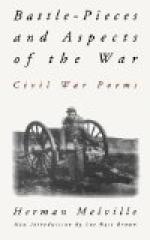Undoubtedly Sherman, in the desolation he inflicted after leaving Atlanta, acted not in contravention of orders; and all, in a military point of view, if by military judged deemed to have been expedient, and nothing can abate General Sherman’s shining renown; his claims to it rest on no single campaign. Still, there are those who can not but contrast some of the scenes enacted in Georgia and the Carolinas, and also in the Shenandoah, with a circumstance in a great Civil War of heathen antiquity. Plutarch relates that in a military council held by Pompey and the chiefs of that party which stood for the Commonwealth, it was decided that under no plea should any city be sacked that was subject to the people of Rome. There was this difference, however, between the Roman civil conflict and the American one. The war of Pompey and Caesar divided the Roman people promiscuously; that of the North and South ran a frontier line between what for the time were distinct communities or nations. In this circumstance, possibly, and some others, may be found both the cause and the justification of some of the sweeping measures adopted.
15. At this period of excitement the thought was by some passionately welcomed that the Presidential successor had been raised up by heaven to wreak vengeance on the South. The idea originated in the remembrance that Andrew Johnson by birth belonged to that class of Southern whites who never cherished love for the dominant: that he was a citizen of Tennessee, where the contest at times and in places had been close and bitter as a Middle-Age feud; the himself and family had been hardly treated by the Secessionists.
But the expectations build hereon (if, indeed, ever soberly entertained), happily for the country, have not been verified.
Likely the feeling which would have held the entire South chargeable with the crime of one exceptional assassin, this too has died away with the natural excitement of the hour.
16. The incident on which this piece is based is narrated in a newspaper account of the battle to be found in the “Rebellion Record.” During the disaster to the national forces on the first day, a brigade on the extreme left found itself isolated. The perils it encountered are given in detail. Among others, the following sentences occur:
“Under cover of the fire from the bluffs, the rebels rushed down, crossed the ford, and in a moment were seen forming this side the creek in open fields, and within close musket-range. Their color-bearers stepped defiantly to the front as the engagement opened furiously; the rebels pouring in sharp, quick volleys of musketry, and their batteries above continuing to support them with a destructive fire. Our sharpshooters wanted to pick off the audacious rebel color-bearers, but Colonel Stuart interposed: ’No, no, they’re too brave fellows to be killed.’”
17. According to a report of the Secretary of War, there were on the first day of March, 1865, 965,000 men on the army pay-rolls. Of these, some 200,000—artillery, cavalry, and infantry—made up from the larger portion of the veterans of Grant and Sherman, marched by the President. The total number of Union troops enlisted during the war was 2,668,000.




